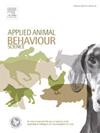社会不稳定对肉鸡学习能力和行为的有害影响
IF 2.2
2区 农林科学
Q1 AGRICULTURE, DAIRY & ANIMAL SCIENCE
引用次数: 0
摘要
肉鸡饲养在非常大的群体中,会与未知的同类反复相遇。我们的目的是评估这些接触对肉鸡学习能力、社会行为和情绪反应的影响。我们在稳定或不稳定的社会条件下饲养了5只雄性中等生长肉鸡(JA 957)(每组16只)。在不稳定条件下,从1日龄到52日龄,每3-4天更换一组5只鸡。在 14 到 18 日龄期间,对肉鸡进行联想学习任务(条件性位置偏好)测试。在带有彩色条纹的特定环境中提供高适口性食物(黄粉虫),然后测试对该环境的偏好。在 21 到 43 日龄期间对鸟类的社交行为进行了分析。在饲养期结束时(46-51 日龄),对鸟类面对新事物时的情绪反应(对未知食物、物体和人类的反应)进行了评估。只有处于稳定状态的鸽子能够将适口食物与提供食物的环境联系起来(p = 0.02)。此外,这些鸟的社会亲和力比不稳定条件下的鸟高(p = 0.01),并且表现出较少的攻击性互动,如攻击性啄食(p = 0.06)、威胁(p = 0.01)或在另一只鸟面前面对面拍打翅膀(p = 0.03)。测试的社会条件对鸡的情绪反应没有明显影响。我们的研究结果表明,与保持稳定的社会条件下的鸡相比,暴露于社会不稳定环境中的鸡的某些学习能力会受到影响。此外,社会不稳定会增加同类之间的攻击性互动,而社会稳定则有利于鸟类的亲近。总之,在不稳定的社会条件下饲养可能会影响鸟类对饲养环境的适应,并增加与同类之间攻击性互动的有害后果。本文章由计算机程序翻译,如有差异,请以英文原文为准。
Deleterious effect of social instability on broiler chicken learning abilities and behaviour
Broiler chickens are reared in very large groups and are submitted to repeated encounters with unknown conspecifics. Our aim was to assess the consequences of these encounters on broiler chickens learning abilities, social behaviour and emotional reactivity. Groups of 5 male medium-growing broiler chickens (JA 957) were reared under stable or unstable social conditions (n=16 groups in each condition). Under the unstable conditions, the 5 birds of the groups changed every 3–4 days from 1 to 52 days of age. Broiler chickens were tested in an associative learning task (conditioned place preference) between 14 and 18 days of age. A highly palatable food (mealworms) was delivered in a particular environment with coloured stripes and preference for this environment was then tested. Social behaviours were analysed between 21 and 43 days of age. Emotional reactivity of the birds when faced with novelty (reactivity to unknown food, object and human) was assessed at the end of the rearing period (46–51 days of age). Only birds from the stable condition were able to associate the palatable food to the environment in which it was delivered (p = 0.02). Furthermore, these birds had a higher social proximity than those from the unstable condition (p < 0.01) and showed less aggressive interactions such as aggressive pecking (p = 0.06), threat (p < 0.01) or facing each other with wing flapping in front of another bird (p = 0.03). The social conditions tested had no significant effect on their emotional reactivity. Our results evidenced that chickens exposed to social instability have some learning abilities impaired compared to chickens maintained in stable social conditions. In addition, social instability increases aggressive interactions between conspecifics, while social stability favours bird proximity. In conclusion, being reared in unstable social conditions likely impairs bird adaptation to their rearing environment and increases deleterious consequences of aggressive interactions with conspecifics.
求助全文
通过发布文献求助,成功后即可免费获取论文全文。
去求助
来源期刊

Applied Animal Behaviour Science
农林科学-行为科学
CiteScore
4.40
自引率
21.70%
发文量
191
审稿时长
18.1 weeks
期刊介绍:
This journal publishes relevant information on the behaviour of domesticated and utilized animals.
Topics covered include:
-Behaviour of farm, zoo and laboratory animals in relation to animal management and welfare
-Behaviour of companion animals in relation to behavioural problems, for example, in relation to the training of dogs for different purposes, in relation to behavioural problems
-Studies of the behaviour of wild animals when these studies are relevant from an applied perspective, for example in relation to wildlife management, pest management or nature conservation
-Methodological studies within relevant fields
The principal subjects are farm, companion and laboratory animals, including, of course, poultry. The journal also deals with the following animal subjects:
-Those involved in any farming system, e.g. deer, rabbits and fur-bearing animals
-Those in ANY form of confinement, e.g. zoos, safari parks and other forms of display
-Feral animals, and any animal species which impinge on farming operations, e.g. as causes of loss or damage
-Species used for hunting, recreation etc. may also be considered as acceptable subjects in some instances
-Laboratory animals, if the material relates to their behavioural requirements
 求助内容:
求助内容: 应助结果提醒方式:
应助结果提醒方式:


